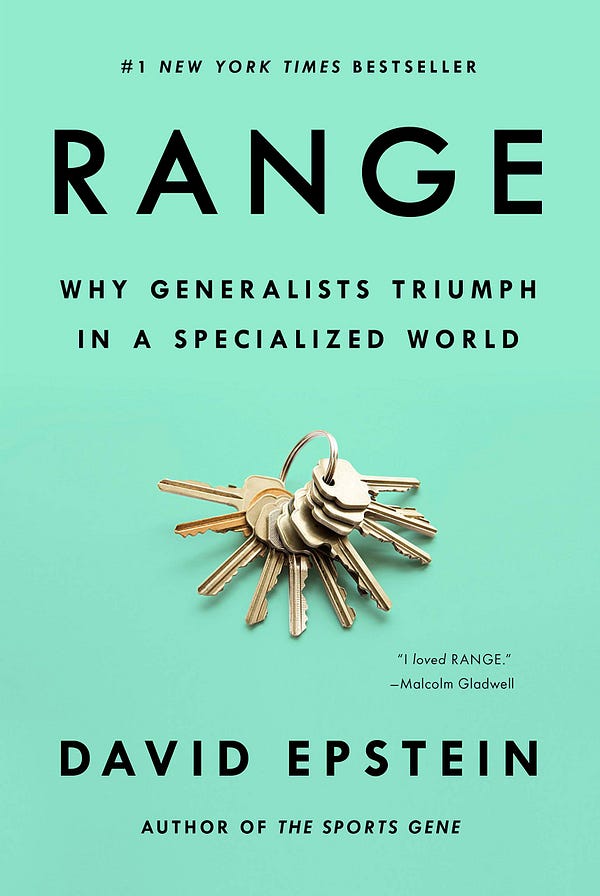Book Review — Range
Book Review — Range
A very interesting book that discusses learning methods, early vs late specialization, generalists vs specialists and so much more. Be…
A very interesting book that discusses learning methods, early vs late specialization, generalists vs specialists and so much more. Be sure to read about the 3 other books you should consider.

Having written more than 35 book reviews, mostly as a method to improve my own retention value of the book, I have come to realize a book review is not a book review at all. At least mine are not. Instead, they turn out to be my perspectives of the book.
Have you ever wondered how some of the most successful CEOs or people in leadership positions, do not have the academic or sometimes even the experiential background of the business they manage? Lawyers run companies, engineers run some, CFOs become CEOs etc. Even at a narrower level, several business units are run by people who didnt necessarily grow up doing work related to that discipline. Park that thought.
I have been very intrigued by a statement I heard somewhere. This is the first time in the history of the world where parents don’t have enough of an insight with any degree of uncertainty to ask their children to study this or that. I have watched and/or read several authors on these lines — including, most prominently — Gladwell, Godin and Harari.
Harari — I am oversimplifying, I admit — basically says to learn to learn fast and adapt quickly to changing job landscape is the key to being relevant. Gladwell most famously popularized the 10,000 hours concept — that if you have to be good at anything, you need to have practiced that for 10,000 hrs. He also warned parents to start early, identify innate talents, and keep at it. Godin, in his book called The Dip, tells that the adage of “never give up” is a sham. He urges people to give up often — just as soon as you realize you have spent long enough in one thing to realize it is not your thing.
Meanwhile, I was curious about my kids’ futures, and my own. What should I learn? How should I expect to be relevant 5–10–15 years from now? For whatever I learn now, it is going to be vestigial in some way — replaced, automated or something else.
I usually my book choices carefully — because I suck at reading. I rely on famous book critics. Not the commercial “bestseller” types of critics — but people that critique or laud the content of these books. My 2 favorite go-to’s are Bill Gates and Fareed Zakaria. I watched an interview of Fareed’s with David Epstein, about his book called Range.
After reading about 1/2 of the book, I commented on Twitter that reading Epstein along with Harari, Gladwell and Godin, will paradoxically cancel out all the learning. Gladwell himself said “everything I thought about something was wrong” while reviewing Range.
Range is a book that deals with a few core concepts
- To specialize or not to specialize — Should I become a pediatric pancreatic oncologist? Or should I become a general surgeon? Or a primary physician?
- Specialize early or specialize late — Tiger Woods specialized early and saw the entire world through golf. He did well. But so did Federer, who specialized very late, but no less accomplished than Woods.
- The value of wandering — Van Gogh did not know his value until much later in his life — closer to his death than when he was a child.
- And a few other related concepts — with ample examples and true stories of specialists and generalists, and their contributions thereof to humanity.
You cannot apply Epstein, or any of the other 3 (Gladwell, Godin and Harari) in isolation. But processing the core concepts of all 4 of these authors, I believe, provides a well-rounded perspective of what’s to come.
Overall, it is a very good read and I highly recommend this book.
PS: I am beginning to form an opinion around non-fiction, single-concept books and their authors. I am not sure if the authors lack brevity or the publisher forces them to write x number of pages, for the reader to perceive a book as being substantive enough. After reading Range, I am convinced that I got 50–60% worth of his wisdom during Epstein’s 10-minute interview with Fareed Zakaria. While I was reading this book, I heard about Ezra Klein’s Why We Are Polarized — now I am in dilemma whether I should get the book, or just walk away with the content I got from Klein’s interview with Zakaria. After all, if my theory is right, I already know 70% of what he is about to say.
By RK Kuppurao on February 7, 2020.
Exported from Medium on February 7, 2020.